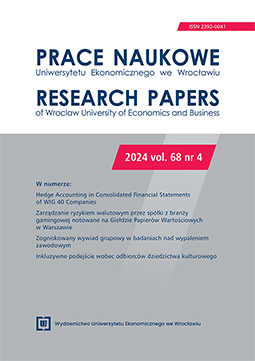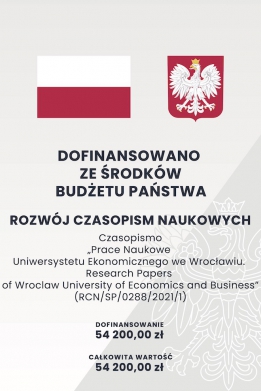The Nature of Local Place Branding Strategies: The Cases of Almaty (KZ); Belo Horizonte (BR) and Wroclaw (PL)
DOI:
https://doi.org/10.15611/pn.2024.4.09Keywords:
place marketing strategy, sustainable economic development, Almaty, Belo Horizonte, WroclawAbstract
Aim: The aim of the research was to identify and evaluate the features of place marketing strategies of Almaty (Kazakhstan), Belo Horizonte (Brazil) and Wroclaw (Poland), as methods of stimulating sustainable economic development.
Methodology: The research employed a comparative case study methodology.
Results: The research showed that although all the place marketing strategies studied are aimed at stimulating local economic processes, they lack features that ensure the sustainability of these processes.
Implications and recommendations: The results indicate limitations and tensions in the area of place branding strategies in the scope of their impact on sustainable economic development thus motivate representative research and the search for more sustainable solutions.
Originality/value: The literature query did not reveal any previous examples of such research, and the methodology was partly original. The article provides new information on the place marketing strategies used in different countries and evaluate them in relation to the paradigm of sustainable development.
Downloads
References
Amorós, J. E., Ciravegna, L., Mandakovic, V., & Stenholm, P. (2019). Necessity or Opportunity? The Effects of State Fragility and Economic Development on Entrepreneurial Efforts. Entrepreneurship: Theory and Practice, 43(4), 725-750. https://doi.org/10.1177/1042258717736857
Audretsch, D. B., Cunningham, J. A., Kuratko, D. F., Lehmann, E. E., & Menter, M. (2019). Entrepreneurial Ecosystems: Economic, Technological, and Societal Impacts. Journal of Technology Transfer, 44(2), 313-325. https://doi.org/10.1007/s10961-0189690-4
Batten, D. F. (1995). Network Cities: Creative Urban Agglomerations for the 21st Century. Urban Studies, 32(2), 313-327. https://doi.org/10.1080/00420989550013103
Cao, Z., & Shi, X. (2021). A Systematic Literature Review of Entrepreneurial Ecosystems in Advanced and Emerging Economies. Small Business Economics, 57(1). https://doi.org/75-110. 10.1007/s11187-020-00326-y
Cavalheiro, M. B., Joia, L. A., & Cavalheiro, G. M. do C. (2020). Towards a Smart Tourism Destination Development Model: Promoting Environmental, Economic, Socio-cultural and Political Values. Tourism Planning and Development, 17(3), 237-259. https://doi.org/10.1080/21568316.2019.1597763
Duignan, M. B., & Pappalepore, I. (2023). How Do Olympic Cities Strategically Leverage New Urban Tourism? Evidence from Tokyo. Tourism Geographies, 25(2-3), 425-449. https://doi.org/10.1080/14616688.2021.1895296
Edensor, T. (2007). Mundane Mobilities, Performances and Spaces of Tourism. Social and Cultural Geography, 8(2), 199-215. https://doi.org/10.1080/14649360701360089
Edmondson, A. C., & Mcmanus, S. E. (2007). Methodological Fit in Management Field Research. Academy of Management Review, 32(4), 1246-1264. https://doi.org/10.5465/AMR.2007.26586086
Eisenhardt, K. M., & Graebner, M. E. (2007). Theory Building from Cases: Opportunities and Challenges. Academy of Management Journal, 50(1), 25-32. https://doi.org/10.5465/AMJ.2007.24160888
Gast, J., Gundolf, K., & Cesinger, B. (2017). Doing Business in a Green Way: A Systematic Review of the Ecological Sustainability Entrepreneurship Literature and Future Research Directions. Journal of Cleaner Production, 147, 44-56. https://doi.org/10.1016/j.jclepro.2017.01.065
Gimenez, F. A. P. (2022). Reflections on Entrepreneurial Ecosystems, Citizen Collectives and Basic Income. REGEPE – Revista de Empreendedorismo e Gestão de Pequenas Empresas, 11(2), 1-8. https://doi.org/10.14211/ibjesb.e2325
Gioia, D. A., Corley, K. G., & Hamilton, A. L. (2013). Seeking Qualitative Rigor in Inductive Research. Organizational Research Methods, 16(1), 15-31. https://doi.org/10.1177/1094428112452151
Global Entrepreneurship Monitor – GEM. (2023). Global Entrepreneurship Monitor 2022/2023 Global Report: Adapting to a “New Normal”. https://gemconsortium.org/report/20222023-global-entrepreneurship-monitor-global-reportadapting-to-a-new-normal-2
Halme, M., Piekkari, R., Matos, S., Wierenga, M., & Hall, J. (2022). Rigour vs. Reality: Contextualizing Qualitative Research in the Low‐Income Settings in Emerging Markets. British Journal of Management, 35(1), 36-51. https://doi.org/10.1111/1467-8551.12690
Kaneva, N. (2011). Nation Branding: Toward an Agenda for Critical Research. International Journal of Communication, 5, 117-141. https://ijoc.org/index.php/ijoc/article/view/704/514
Kerimray, A., Baimatova, N., Ibragimova, O. P., Bukenov, B., Kenessov, B., Plotitsyn, P., & Karaca, F. (2020). Assessing Air Quality Changes in Large Cities during COVID-19 Lockdowns: The Impacts of Traffic-Free Urban Conditions in Almaty, Kazakhstan. Science of The Total Environment, 139179(730), 1-8. https://doi.org/10.1016/j.scitotenv.2020.139179
Klopp, J. M., & Petretta, D. L. (2017). The Urban Sustainable Development Goal: Indicators, Complexity and the Politics of Measuring Cities. Cities, 63, 92-97. https://doi.org/10.1016/j.cities.2016.12.019
Krishnan, A. M. (2016). Entrepreneurship and the Discovery and Exploitation of Business Opportunities: Empirical Evidence from the Malawian Tourism Sector. In M. M. Mariani, W. Czakon, D. Buhalis, & O. Vitouladiti (Eds.), Tourism Management, Marketing, and Development: Performance, Strategies, and Sustainability. Palgrave Macmillan. https://doi.org/10.1057/9781137401854_4
Muñoz, P., & Cohen, B. (2018). Sustainable Entrepreneurship Research: Taking Stock and Looking Ahead. Business Strategy and the Environment, 27(3), 300-322. https://doi.org/10.1002/bse.2000
Njoroge, M., Anderson, W., Mossberg, L., & Mbura, O. (2020). Entrepreneurial Orientation in the Hospitality Industry: Evidence from Tanzania. Journal of Entrepreneurship in Emerging Economies, 12(4), 523-543. https://doi.org/10.1108/JEEE-11-20180122
Ogonowska, M., & Torre, D. (2016). Towards Sustainable Tourism. In M. M. Mariani, W. Czakon, D. Buhalis, & O. Vitouladiti (Eds.), Tourism Management, Marketing, and Development: Performance, Strategies, and Sustainability. Palgrave Macmillan. https://doi.org/10.1057/9781137401854_10
Pflieger, G., & Rozenblat, C. (2010). Introduction. Urban Networks and Network Theory: The City as the Connector of Multiple Networks. Urban Studies, 47(13), 2723-2735. https://doi.org/10.1177/0042098010377368
Pumain, D. (2021). From Network of Cities to Systems of Cities, In C. Rozenblat & Z. Neal (Eds.) Handbook of Cities and Networks, (pp. 16-40). Edward Elgar Publisher. https://doi.org/10.4337/9781788114714.00007
Rodríguez-Pose, A., & Wilkie, C. (2017). Revamping Local and Regional Development Through Place-Based Strategies. Cityscape, 19(1), 151-170. https://www.jstor.org/stable/26328304
Różycka-Czas, R., Czesak, B., & Staszel, A. (2021). Which Polish Cities Sprawl the Most. Land, 10(12), 1291, 1-18. https://doi.org/10.3390/land10121291
Sharpley, R., (2015). Tourism: A Vehicle for Development? In R. Sharpley & D. J. Telfer (Eds.) Tourism and Development: Concepts and Issues, (pp. 3-30). Channel View Publications. https://doi.org/10.21832/9781845414740-003
Sztando, A. (2017). Local Culture in Supra-local Perspective of Local Development Strategic Governance of Polish Small Towns. Studia Ekonomiczne, 314, 61-79. https://cejsh.icm.edu.pl/cejsh/element/bwmeta1.element.cejsh-a4dc14c2-c7e4-4373a1aa-b53803c90b67
Tammpuu, P., & Masso, A. (2018). ‘Welcome to the Virtual State’: Estonian E-residency and the Digitalized State as a Commodity. European Journal of Cultural Studies, 21(5), 543-560. https://doi.org/10.1177/1367549417751148
United Nations. (2015). Transforming Our World: The 2030 Agenda for Sustainable Development. United Nations. https://sustainabledevelopment.un.org/content/documents/21252030%20Agenda%20for%20Sustainable%20Develop ment%20web.pdf
United Nations. (2022). The Sustainable Development Goals Report 2022. United Nations. https://unstats.un.org/sdgs/report/2022/
Van Ham, P. (2008). Place Branding: The State of the Art. Annals of the American Academy of Political Science, 616(1), 126-149. https://doi.org/10.1177/0002716207312274
World Health Organization(2018). Millennium Development Goals (MDGs). World Health Organization. https://www.who.int/news-room/fact-sheets/detail/millennium-development-goals-(mdgs)
World Tourism Organization (2020). Recommendations on Urban Tourism. UNWTO Recommendations on Urban Tourism.
World Tourism Organization (UNWTO). https://doi.org/10.18111/9789284422012
Wurth, B., Stam, E., & Spigel, B. (2022). Toward an Entrepreneurial Ecosystem Research Program. Entrepreneurship Theory and Practice, 46(3), 729-778. https://doi.org/10.1177/1042258721998948
Yusupova, G., & Pfoser, A. (2023) Tourism, Memory Production and Contested Ethnic Hierarchies in Post-Soviet Almaty. Europe-Asia Studies, 75(3), 491-508. https://doi.org/10.1080/09668136.2021.1964437
Downloads
Published
Issue
Section
Categories
License
Copyright (c) 2024 Andrzej Sztando, João Paulo Moreira Silva, Aizhan Kazybayeva

This work is licensed under a Creative Commons Attribution-ShareAlike 4.0 International License.
Accepted 2024-09-16
Published 2024-12-17









